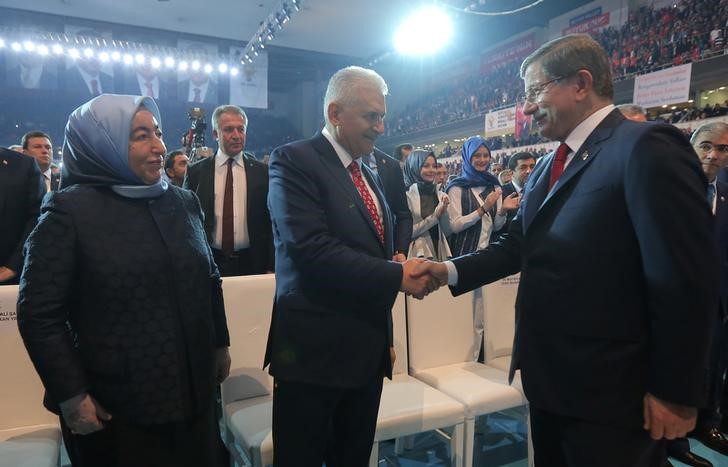By Orhan Coskun and Nick Tattersall
ANKARA (Reuters) - As Turkey's incoming prime minister prepares to name his new cabinet, there is little doubt that its primary role will be to rubber-stamp what has already become reality: a shift to a full presidential system with Tayyip Erdogan firmly in charge.
Erdogan on Sunday confirmed Binali Yildirim, a close ally for two decades and a co-founder of the ruling AK Party, as his new prime minister, ensuring government loyalty as he pursues constitutional change to replace Turkey's parliamentary democracy with an executive presidency.
Yildirim's appointment will stamp out any vestiges of resistance in the AKP to Erdogan's plans, three senior party officials said, forecasting that the new cabinet, expected to be announced on Tuesday, would contain only loyalists.
"We have entered a period of a 'de facto' presidential system, where Erdogan's policies will be implemented very clearly," one of the officials said, predicting five or six ministerial changes from the existing team.
"They will lead to complete harmony between Erdogan and the cabinet ... Erdogan’s decisions will be implemented without being touched," the official said, speaking anonymously because the final decision on the appointments has not yet been made.
Erdogan and his supporters see an executive presidency - a Turkish take on the system in the United States or France - as a guarantee against the sort of fractious coalition politics that hampered Turkey's development in the 1990s, when it was an economic backwater with little clout on the world stage.
His opponents, and skeptical Western allies, fear growing authoritarianism. Prosecutors have opened more than 1,800 cases against people for insulting Erdogan since he became president in 2014. Opposition newspapers have been shut and journalists and academics critical of government policies sacked.
European Parliament President Martin Schulz criticized Erdogan's accumulation of power in comments published on Monday, describing it as a "breathtaking departure from European values" in a nation negotiating for membership of the EU.
"We see Turkey under Erdogan on its way to being a one-man-state," he told German newspaper Koelner Stadtanzeiger.
He said the European Parliament would not begin debating visa-free travel for Turks to Europe, a quid pro quo for Ankara's help in curbing illegal migration, until Turkey fulfilled all the criteria including amending its sweeping anti-terrorism laws, which Erdogan has resolutely refused to do.
German Chancellor Angela Merkel, who has faced criticism for brokering the migration deal with Turkey despite its rights record, said she stressed in a meeting with Erdogan on Monday the need for strong independent institutions.
"I've made clear in the conversation today that I also think we need an independent judicial system, we need independent media and we need a strong parliament," she said, after a meeting on the sidelines of a humanitarian summit in Istanbul.
In a sign of the possible turbulent relations to come with Brussels, Erdogan's economic advisor Yigit Bulut warned Ankara could suspend all of its agreements with the European Union if it failed to "keep its promises".
MASTER MANEUVERER
Erdogan has made clear he wants to seek legitimacy for the presidential system, which will require constitutional change, via a referendum. To do that, he will need the support of at least 330 members of the 550-strong parliament, and unwavering backing from the AKP grass roots on the campaign trail.
Outgoing Prime Minister Ahmet Davutoglu was seen as too lackluster a supporter of Erdogan's ambitions. By replacing him, Erdogan aims to unify the AKP just as the nationalist opposition is embroiled in a damaging leadership row and the pro-Kurdish opposition faces the risk of its members being prosecuted after their parliamentary immunity was removed last week.
"Now the road to changing the constitution to include a presidential system is completely open," a second senior AKP official told Reuters.
Popular support for such constitutional change is unclear, with a recent IPSOS poll putting it at just 36 percent. The ORC research firm was meanwhile cited in the pro-government Daily Sabah newspaper as putting it at 58 percent.
"The one-man rule has de facto begun, even though not constitutionally," Ozer Sencar, director of the Metropoll research firm, told Reuters.
Yildirim, who has said his main aim as prime minister will be forging a new constitution, said on Monday the new cabinet list would be prepared quickly and be presented to Erdogan, who must approve it, as soon as he is available.
Investors are most concerned about the shape of the new economic team, in particular whether Deputy Prime Minister Mehmet Simsek, an anchor of confidence in overall charge of economic policy, will retain his post.
A third AKP official, close to Erdogan, said it was crucial to keep an experienced team in place during turbulent economic times but that ultimately it would be the president's decision.
His advisor Bulut, a former TV commentator who once accused opponents of trying to kill Erdogan through telekinesis, said that economic policy in Turkey would continue to be based on manufacturing, whoever was in charge.
"If the system is solid, if it's working well, it doesn't matter who is running it," he told state broadcaster TRT.
